译林版(2020) 必修第三册Unit 3 The world online 单元复习课件(98张)
文档属性
| 名称 | 译林版(2020) 必修第三册Unit 3 The world online 单元复习课件(98张) |  | |
| 格式 | pptx | ||
| 文件大小 | 1.0MB | ||
| 资源类型 | 教案 | ||
| 版本资源 | 牛津译林版(2019) | ||
| 科目 | 英语 | ||
| 更新时间 | 2022-09-13 09:58:50 | ||
图片预览

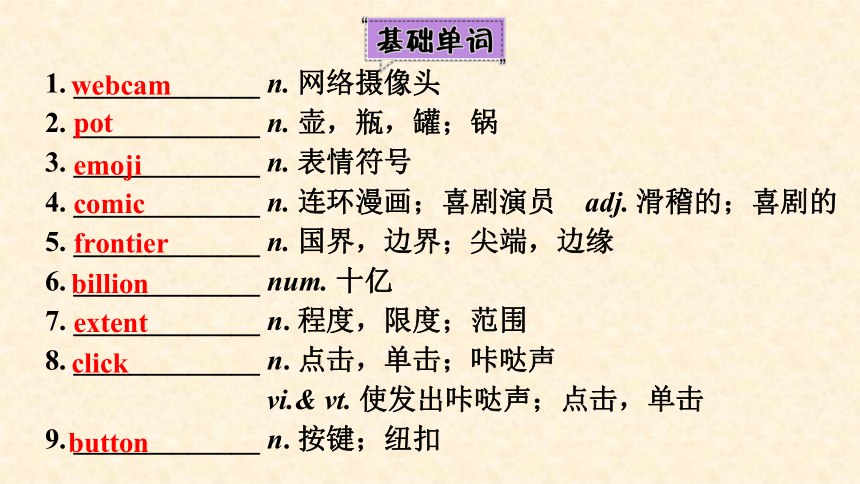
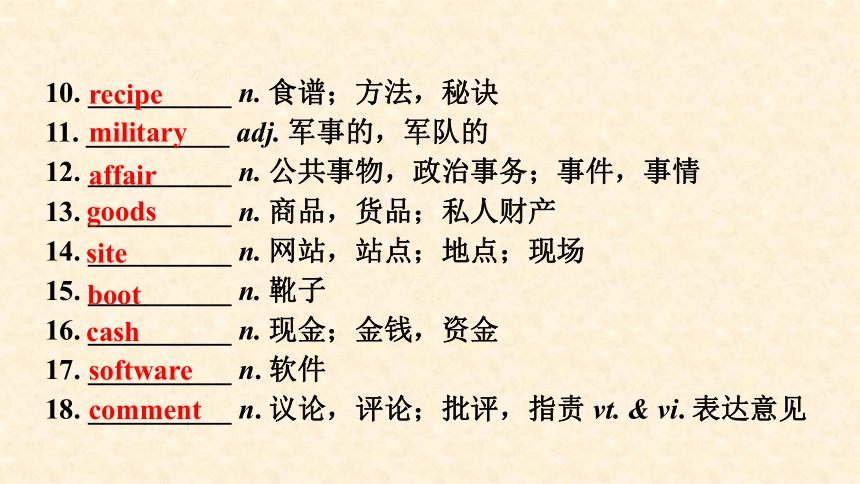
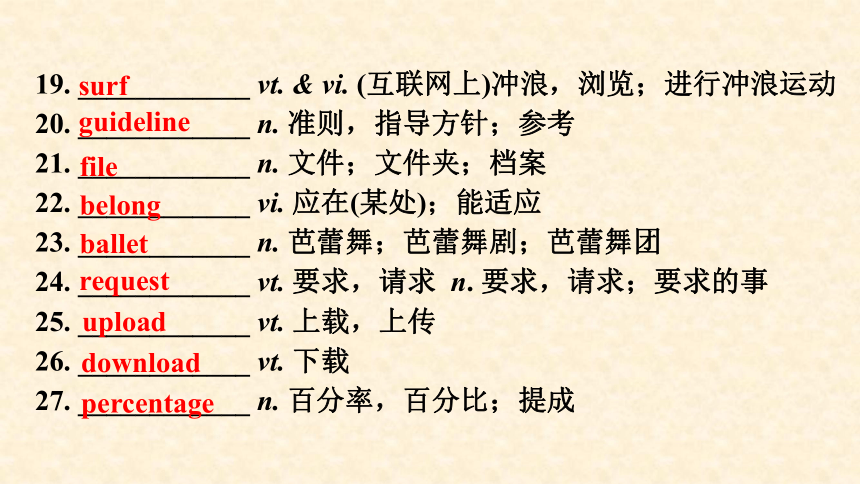
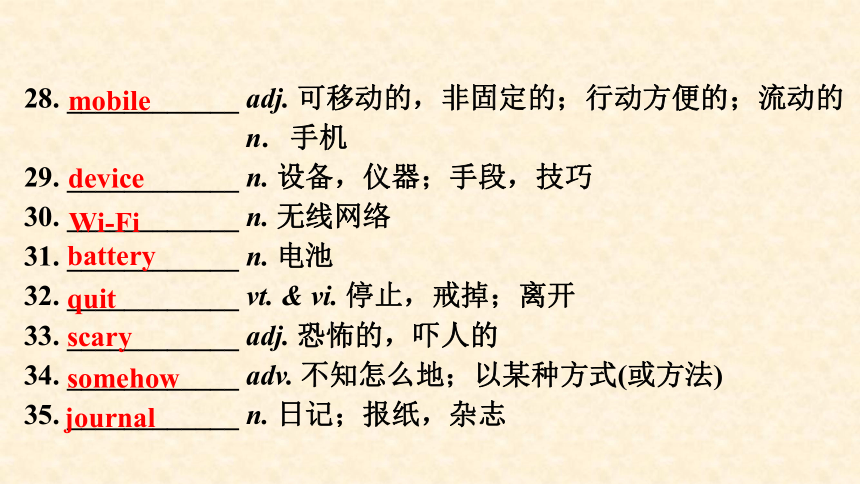
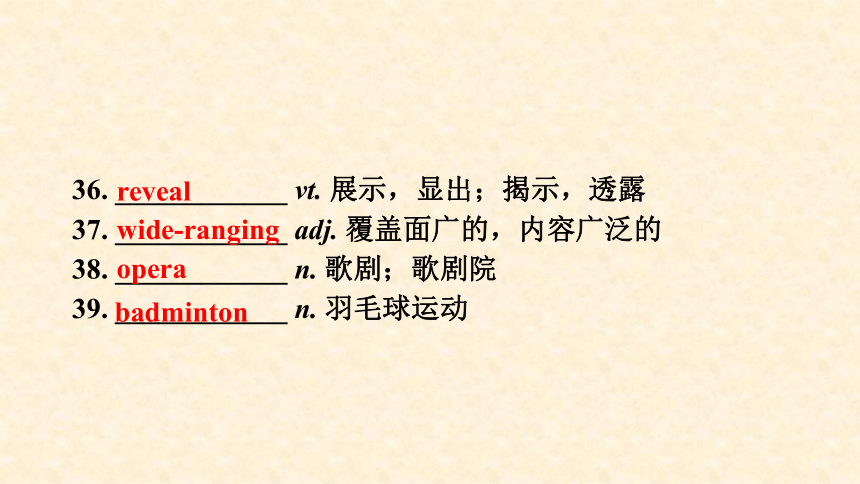
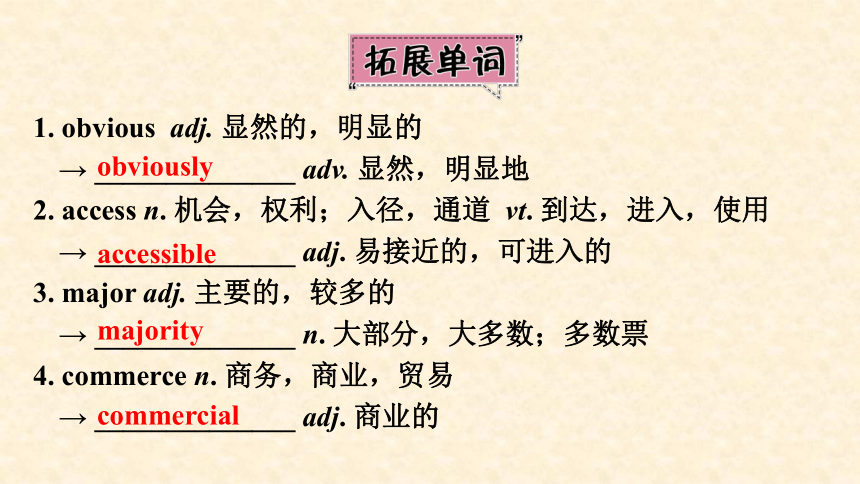
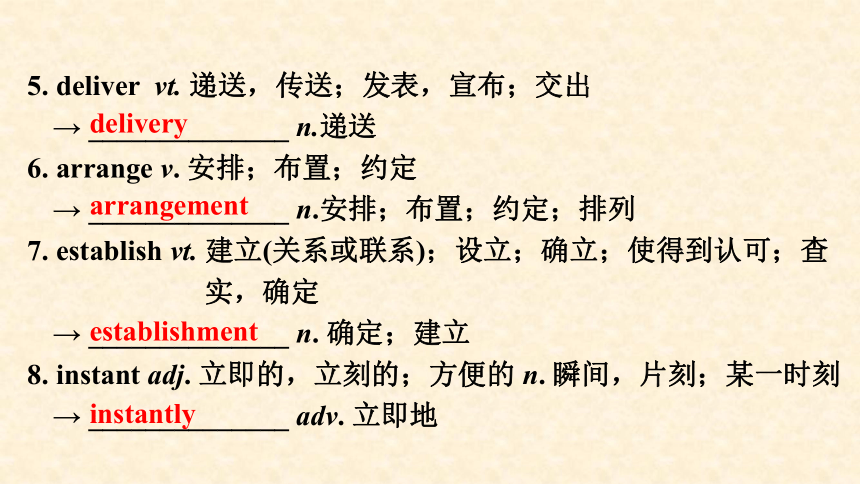
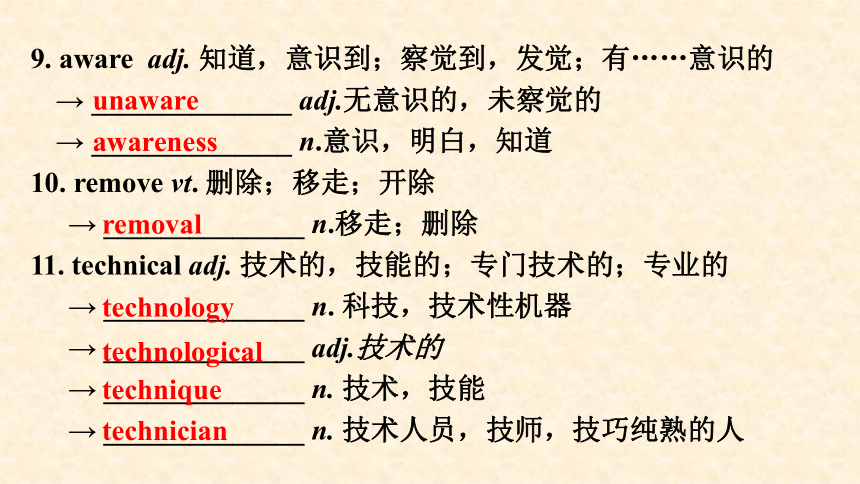
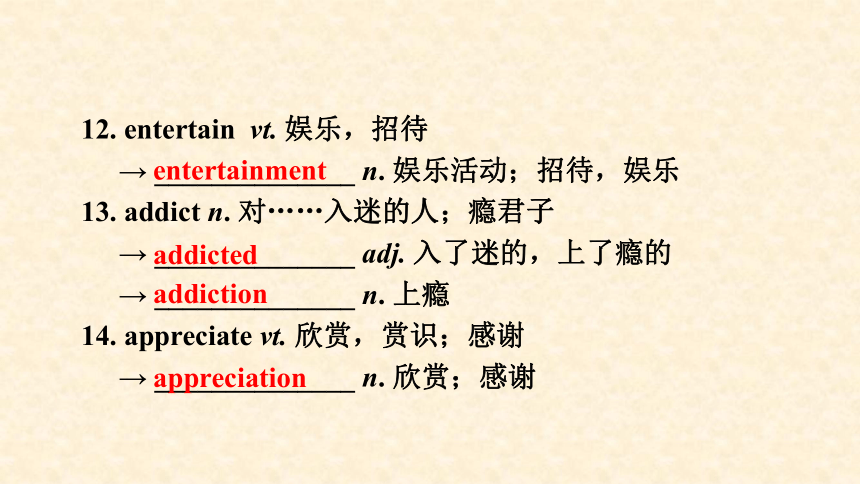
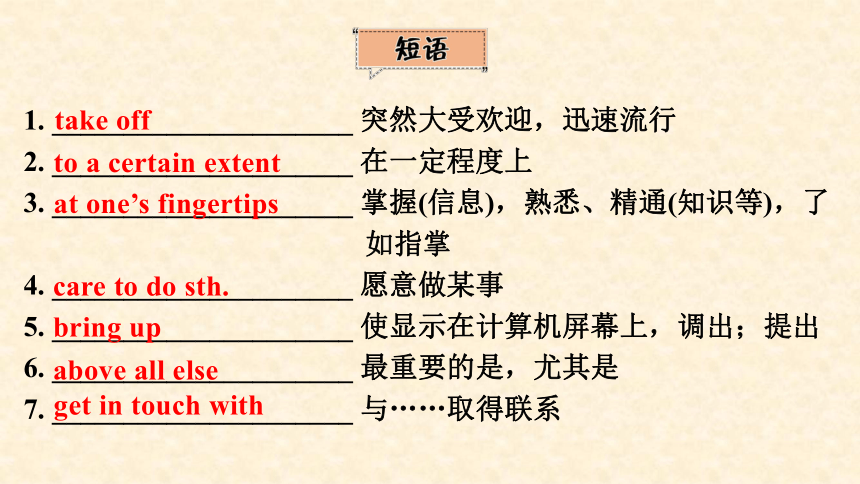
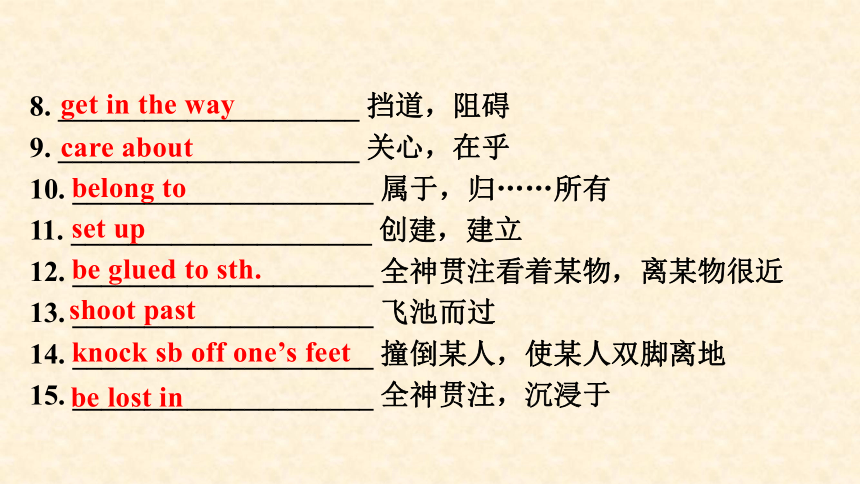
文档简介
(共98张PPT)
UNIT 3 The world online
牛津新教材必修3
1. _____________ n. 网络摄像头
2. _____________ n. 壶,瓶,罐;锅
3. _____________ n. 表情符号
4. _____________ n. 连环漫画;喜剧演员 adj. 滑稽的;喜剧的
5. _____________ n. 国界,边界;尖端,边缘
6. _____________ num. 十亿
7. _____________ n. 程度,限度;范围
8. _____________ n. 点击,单击;咔哒声
vi.& vt. 使发出咔哒声;点击,单击
9. _____________ n. 按键;纽扣
webcam
pot
emoji
comic
frontier
billion
extent
click
button
10. __________ n. 食谱;方法,秘诀
11. __________ adj. 军事的,军队的
12. __________ n. 公共事物,政治事务;事件,事情
13. __________ n. 商品,货品;私人财产
14. __________ n. 网站,站点;地点;现场
15. __________ n. 靴子
16. __________ n. 现金;金钱,资金
17. __________ n. 软件
18. __________ n. 议论,评论;批评,指责 vt. & vi. 表达意见
recipe
military
affair
goods
site
boot
cash
software
comment
19. ____________ vt. & vi. (互联网上)冲浪,浏览;进行冲浪运动
20. ____________ n. 准则,指导方针;参考
21. ____________ n. 文件;文件夹;档案
22. ____________ vi. 应在(某处);能适应
23. ____________ n. 芭蕾舞;芭蕾舞剧;芭蕾舞团
24. ____________ vt. 要求,请求 n. 要求,请求;要求的事
25. ____________ vt. 上载,上传
26. ____________ vt. 下载
27. ____________ n. 百分率,百分比;提成
surf
guideline
file
belong
ballet
request
upload
download
percentage
28. ____________ adj. 可移动的,非固定的;行动方便的;流动的 n. 手机
29. ____________ n. 设备,仪器;手段,技巧
30. ____________ n. 无线网络
31. ____________ n. 电池
32. ____________ vt. & vi. 停止,戒掉;离开
33. ____________ adj. 恐怖的,吓人的
34. ____________ adv. 不知怎么地;以某种方式(或方法)
35. ____________ n. 日记;报纸,杂志
mobile
device
Wi-Fi
battery
quit
scary
somehow
journal
36. ____________ vt. 展示,显出;揭示,透露
37. ____________ adj. 覆盖面广的,内容广泛的
38. ____________ n. 歌剧;歌剧院
39. ____________ n. 羽毛球运动
reveal
wide-ranging
opera
badminton
1. obvious adj. 显然的,明显的
→ ______________ adv. 显然,明显地
2. access n. 机会,权利;入径,通道 vt. 到达,进入,使用
→ ______________ adj. 易接近的,可进入的
3. major adj. 主要的,较多的
→ ______________ n. 大部分,大多数;多数票
4. commerce n. 商务,商业,贸易
→ ______________ adj. 商业的
obviously
accessible
majority
commercial
5. deliver vt. 递送,传送;发表,宣布;交出
→ ______________ n.递送
6. arrange v. 安排;布置;约定
→ ______________ n.安排;布置;约定;排列
7. establish vt. 建立(关系或联系);设立;确立;使得到认可;查实,确定
→ ______________ n. 确定;建立
8. instant adj. 立即的,立刻的;方便的 n. 瞬间,片刻;某一时刻
→ ______________ adv. 立即地
delivery
arrangement
establishment
instantly
9. aware adj. 知道,意识到;察觉到,发觉;有……意识的
→ ______________ adj.无意识的,未察觉的
→ ______________ n.意识,明白,知道
10. remove vt. 删除;移走;开除
→ ______________ n.移走;删除
11. technical adj. 技术的,技能的;专门技术的;专业的
→ ______________ n. 科技,技术性机器
→ ______________ adj.技术的
→ ______________ n. 技术,技能
→ ______________ n. 技术人员,技师,技巧纯熟的人
unaware
awareness
removal
technology
technological
technique
technician
12. entertain vt. 娱乐,招待
→ ______________ n. 娱乐活动;招待,娱乐
13. addict n. 对……入迷的人;瘾君子
→ ______________ adj. 入了迷的,上了瘾的
→ ______________ n. 上瘾
14. appreciate vt. 欣赏,赏识;感谢
→ ______________ n. 欣赏;感谢
entertainment
addicted
addiction
appreciation
1. _____________________ 突然大受欢迎,迅速流行
2. _____________________ 在一定程度上
3. _____________________ 掌握(信息),熟悉、精通(知识等),了如指掌
4. _____________________ 愿意做某事
5. _____________________ 使显示在计算机屏幕上,调出;提出
6. _____________________ 最重要的是,尤其是
7. _____________________ 与……取得联系
take off
to a certain extent
at one’s fingertips
care to do sth.
bring up
above all else
get in touch with
8. _____________________ 挡道,阻碍
9. _____________________ 关心,在乎
10. _____________________ 属于,归……所有
11. _____________________ 创建,建立
12. _____________________ 全神贯注看着某物,离某物很近
13. _____________________ 飞池而过
14. _____________________ 撞倒某人,使某人双脚离地
15. _____________________ 全神贯注,沉浸于
get in the way
care about
belong to
set up
be glued to sth.
shoot past
knock sb off one’s feet
be lost in
16. _________________________ 减少,削减
17. _________________________ 代替,而不是
18. _________________________ 伸手拿……
19. _________________________ 占据(时间、空间)
20. _________________________ 戒掉习惯
21. _________________________ 下定决心做某事
22. _________________________ 习惯于做某事
23. _________________________ 使慢下来,使减速
cut back on
instead of
reach for
take up
quit the habit
make up one’s mind to do sth.
be/get used to doing sth.
slow down
1. Why do sth. 句型
Why wait hopelessly for a taxi in the cold rain (P31)
2. “no matter…” 引导让步状语从句
No matter where we are, we are able to keep in contact with loved ones, find long-lost friends and discover whole new communities who share our hobbies. (P31)
3. “only+状语”置于句首时的倒装结构
Only in this way can the Internet be a place of discovery, wonder and inspiration for everyone. (P31)
4. find+宾语+宾补
“She always found dance relaxing after a long day at school, ”she said. (P34)
5. that引导同位语从句
Sometimes I had the uncomfortable feeling that this little machine had taken up too much of my time, and that I could have done something more meaningful than just looking at a tiny screen all day. (P39)
7. “否定词+比较级”表达最高级含义
We had never felt closer to each other. (P40)
6. “疑问词+to do”结构
I was used to checking the news and my friends’ social media updates every few minutes, but now I did not know what to do with myself. (P39)
1. obviously adv. 显然,明显地
Billions of people in different parts of the world have joined it already, and obviously many more will follow. (P30)
obvious adj. 明显的,显而易见的;易理解的
It is obvious that… 很明显…… (=It is clear/ apparent that …)
be obvious to sb. 对某人来说是显而易见的
for obvious reasons 出于显而易见的原因
【语境应用】单句语法填空。
1) It is obvious __________ they are having fun with each other at the seaside.
2) __________ (obvious), you will be forgiven if you make an apology to him from the bottom of your heart.
3) There are __________ (obviously) connections between diet and health.
that
Obviously
obvious
2. access n. 机会,权利;入径,通道 vt. 到达,进入;范围
We can achieve almost anything online – with access to the Internet come some truly life-changing advantages. (P30)
have access to 拥有……的机会;可以接近;进入
give access to 准许进入(接近)
access to sth. 去……的通道
accessible adj. 可接近的;可进入的;可使用的
be accessible to… 可接近;可靠近;可使用……
【语境应用】根据括号内的提示补全下列句子。
1) Eva ________________________________ (访问了3个不同的文件) to find the correct information.
2) Students must ____________________________ (有使用图书馆的机会).
3) There is no ____________________________ (通向大街的路) through that door.
accessed three different documents
have access to a library
access to the street
3. majority n. 大部分,大多数;多数票
No wonder the Internet has now become the first place that the majority of people turn to for information. (P30)
the/a majority of 大多数的
in the majority 占多数
minority n. 少数
in the minority 占少数
major adj. 主要的 vi. 专修; 主攻 n. 主修课程
major in 主修……;以……为专业
1) the majority和the minority单独用作主语时,若强调整体,谓语动词用单数形式;若强调个体,谓语动词则用复数形式;但其后表语是复数时,谓语动词通常也要用复数。
2) “the/a majority of+名词”用作主语,其谓语动词的数应与名词的数保持一致。
【语境应用】单句语法填空。
1) For one thing, I hope to gain a bit more knowledge of gardening so that it can help me to major _________ the gardening after attending college.
2) An agreement seems to be impossible because the majority of the committee members _________ (be) against it.
3) The _________ (major) of them take on online language test
before starting their programme.
in
are
majority
4. deliver vt. & vi. 递送,传送 vt. 发表,宣布;交出
You can have food delivered to you using food delivery apps and sites. (P31)
deliver sth. to sb. 把……传递给某人
deliver papers 送报纸 deliver the goods 发货
deliver sb. from danger 救某人脱离险境
deliver a speech/ lecture 发表演讲
delivery n. 传送;递送
a delivery van 厢式送货车
the delivery of public services 提供公共事业服务
【语境应用】单句语法填空。
1) Our headmaster ___________ (deliver) a long inspiring speech yesterday.
2) You promised to deliver the goods ___________ us, but we haven’t seen any of them yet.
3) You can either pick up the goods or have them __________ (deliver)
delivered
to
delivered
4) Once his message ___________ (deliver), he allowed me to stay and watch.
5) I finally quit __________ (deliver) newspapers and didn’t see Mrs. Stanley for several years.
6) The strike caused a great delay in the ____________ (deliver) of the mail.
was delivered
delivering
delivery
5. arrangement n. 安排;布置;约定;排列
When you wish to go on holiday, you can make all your travel arrangements just in front of the computer. (P31)
make arrangements / an arrangement for 为……做好准备
arrive at/ come to an arrangement 谈妥,达成协议
arrange v. 安排;筹备;整理;排列;布置
arrange for sth. 安排某事
arrange to do sth. 安排做某事
arrange sth. for sb. 为某人安排某事
arrange for sb. to do sth. 安排某人做某事
【语境应用】单句语法填空/ 完成句子。
1) Can I arrange an appointment ____________ Monday
2) They had an ____________ (arrange) that the children would spend two weeks with each parent.
3) Whatever she says will not make any difference to ________________.
无论她说什么都不会对我们的安排有影响。
for
arrangement
our arrangements
6. establish vt. 建立(关系或联系);设立;确立;使得到认可;查实,确定
Above all else, the Internet helps us establish and maintain social ties. (P31)
establish a company 建立公司
establish a new research centre 建立一个新的研究中心
establish relations/ links/ contact with sb.
与某人建立关系或联系
(1) established adj. 已确立的;著名的
an established actor 著名演员
(2) establishment n. 建立;创立;确立
the establishment of diplomatic relations between the countries 国家间外交关系的建立
【语境应用】单句语法填空。
1) The company _____________ (establish) in 1899.
2) I wondered why he should bother to try _____________ (establish) contact with me.
was established
to establish
7. instant adj. 立即的; 立刻的;方便的 n. 瞬间; 片刻
An instant message, a group chat, a video call, a comment on an update – there are endless ways to share our views or let someone know we care about them. (P31)
(1) instant coffee 速溶咖啡 instant noodles 方便面
(2) in an instant=instantly/immediately 立刻;马上
for an instant 刹那间
the instant=instantly
the moment/the minute+从句 一……就……
instantly adv. 立即,马上
【语境应用】单句语法填空。
1) ________ (instant) the famous singer turned up at the meeting, the crowd cheered.
2) The ________ (instantly) I saw him, I knew he was the man the police were looking for.
Instantly
instant
8. aware adj. 知道,意识到;察觉到,发觉;有……意识的
As with any great invention, we must be aware of these problems and be careful to use the Internet properly and responsibly. (P31)
be /become aware of 对……知道、明白;意识到
be aware that… 意识到/体会到……
as far as I’m aware 据我所知
awareness n. 意识;认识
raise awareness of 加强……认识
arouse sb.’s awareness of … 唤起某人……的意识
【语境应用】翻译下面句子。
1) 我甚至没有察觉到他生病了。
2) 他已经意识到了这个问题。
3) 我察觉到他在看我。
I wasn't even aware that he was ill.
He was already aware of the problem.
I was aware of him looking at me. / I was aware that he was looking at me.
9. remove vt. 删除;移走;开除
One wrong click may damage your computer and remove all your computer files! (P31)
remove...from… 把……从……移开
remove...to... 把……搬到……
remove sb. from school 开除某人; 勒令某人退学
remove one’s doubt/ trouble 消除某人的疑虑/烦恼
remove sb. from one’s post 开除;撤职
removal n. 移动;消除
the removal of a tumour 肿瘤切除
stain removal 消除污渍
the removal of trade barriers 贸易壁垒的消除
【语境应用】单句语法填空。
1) Just before the flood came, some furniture and blankets in his house were removed _________ a higher place.
2) You’d better have the old furniture _________ (remove).
3) To our amazement, the official was removed ___________ office.
4) When fat and salt ____________ (remove) from food, the food tastes as if it is missing something.
to
removed
from
are removed
10. belong vt. 应在(某处);能适应
JustDance is a website belonging to all dance lovers. (P34)
belong to sb. 属于某人,归某人所有
belong to the golf club 是高尔夫球俱乐部的成员
belong to the cat family 属于猫科
belongings n. (pl.) 所有物;财产,财物
a sense of belonging 归属感
personal belongings 个人财物,私人用品
【语境应用】单句语法填空。
1) Professor Williams keeps telling his students that the future __________ (belong) to the well-educated.
2) He was upset that the valuable watch __________ (belong) to him was lost yesterday.
3) The old house which __________ (belong) to my grandfather is still in good condition.
belongs
belonging
belongs
4) He took away the suitcase not belonging __________ him by design.
5) I just escaped from the flood and all my __________ (belong) were swept away.
6) I don’t know __________ whom this computer belongs.
to
belongings
to
Sliding into the habit was easy, but it was difficult to quit the habit. (P39)
quit doing sth. 停止做某事
quit school 退学
quit one’s job 辞职
quit as… 辞去……的职务
11. quit vt. & vi. 停止,戒掉;离开
【语境应用】单句语法填空。
1) Though the man is ill, he has not quit ___________ (smoke).
2) We decided it was time ___________ (quit) the city.
3) He quit his job ____________ an office boy in Athens.
smoking
to quit
as
Best of all, I began to appreciate the beauty in life with my own eyes, instead of through my smartphone camera. (P40)
appreciate one’s help/ support/ concern 感激某人的帮助/支持/关心
appreciate (one’s ) doing sth. 感激(某人)做某事
I would appreciate it if… 如果……,我将不胜感激
appreciate fine works of art 欣赏优秀的艺术作品
12. appreciate vt. 欣赏,赏识;感谢
(1) appreciation n. 感激
express one’s appreciation / thanks to sb. for sth.
对某人表达感激之情
have/ show appreciation of 对……有/ 表现出鉴赏力
in appreciation of 作为感谢……
(2) appreciative adj. 感激的;欣赏的
be appreciative of 对……感激
an appreciative audience/ smile 有欣赏力的观众/会意的微笑
appreciative laughter/ comments 赞赏的笑声/ 议论
【语境应用】单句语法填空。
Here I sincerely express my ____________ (appreciate) if you could help find the lost suitcase.
I would appreciate _____ if you would set aside the whole day on March 3 so that I can meet with you.
I would appreciate you _________ (call) back this afternoon.
appreciation
it
calling
1. take off 突然大受欢迎,迅速流行;脱下;起飞;突然开始成功;休假
Soon emojis took off throughout the world. (P29)
take down 拿下,记录下,拆卸
take back 带回,收回(话)
take...for granted 认为……理所当然,理应如此
take … for… 认为
take on 呈现;雇用;承担
take up 占据;拿起;着手处理; 从事,
开始(做);接纳(乘客); 继续
take over 接管,接任
take in 欺骗;吸收;理解,领会
take … as … 把……看作……
take after 与……相像
【语境应用】单句语法填空。
1) Many businesses started up by college students have taken
__________ thanks to the comfortable climate for business creation.
2) I was given some tablets to take __________ the pain.
3) Roger took __________ painting for a while, but soon lost interest.
4) He took __________ my wet boots and made me sit by the fire.
off
away
up
off
5) Some insects can take __________ the colour of their surroundings to protect themselves.
6) Cleaning up all the garbage takes __________ his free time.
7) don’t be taken __________ by his charm – he’s cruel.
8) She decided that I was the ideal person to take __________
The job in place of the manager.
on
up
in
over
2. bring up 使显示在计算机屏幕上,调出;提出;抚养,养育,教养;呕吐
In the time it takes to find one book in the library, we can use a search engine to bring up millions of results. (P30)
be brought up to do sth. 从小被教导要做某事
bring up a subject 提出某一话题
bring up one’s lunch 把午饭吐出来
bring短语
bring about 引起; 产生; 导致; 带来
bring in 带进来; 引进; 赚得
bring out 使显现; 阐明; 出版; 生产
bring back 归还; 使……回想起
bring down 使降低, 减少; 打垮, 击败
bring on 引起, 使发生
bring forward 将……提前,提议
【语境应用】单句语法填空。
1) I don’t clearly remember who brought ___________ the question but I clearly remember it brought ___________ a heated discussion.
2) This picture often brings ___________ to me many happy memories of my high school days.
3) Born into a family with brothers and sisters, Monty was brought ___________ to value the sense of sharing.
4) Working with the medical team in Africa has brought ___________ the best in her as a doctor.
up
about
back
up
out
3. no wonder 难怪……;……并不奇怪
No wonder the Internet has now become the first place that the majority of people turn to for information. (P30)
It’s no wonder (that).../No wonder (that)... 难怪……
It’s a wonder (that)... 令人惊奇的是……
It’s little/small wonder that... 不足为奇; 并不奇怪
I wonder how/what/who… 想知道……
I am wondering if/whether…不知道可不可以……
【语境应用】完成句子。
1) I was wondering ________ you’d like to come to a party.
不知您能否来参加聚会。
2) ______________ you can’t find anybody here; they’re all
away at a meeting.
难怪找不到人,都开会去了。
whether
No wonder
—Next time you visit Bob, remember to give him a call in advance.
—______. I will. (2020天津)
My pleasure B. No wonder C. Good point D. Never mind
C
4. above all else 重要的是,首先,尤其是
Above all else, the Internet helps us establish and maintain social ties. (P31)
in all 总共,总计
all in all 总的来说
after all 毕竟,终究;别忘了
(not) at all 一点也(不),完全(不)
first of all 首先,第一
【语境应用】完成句子。
1) To be great, you must be smart, confident, and, ____________, honest.
要成为伟大的人,你必须聪明、自信,最重要的是要诚实。
2) There are twenty books ___________ in the drawer.
抽屉里一共有二十本书。
above all
in all
5. set up 创建,建立;设置;成立;安装;(购置房子)自立门户;开办
Fiona wanted to introduce more people to dance, so she set up JustDance. (P34)
set up facilities 建立设施
set up the foundation 建立基地
set up the equipment 安装设备
set up a company 开办公司
set up roadblocks 设置路障
set up camp 搭建帐篷
set up an online campaign 在网上发起一项活动
set about (doing sth.) 着手,开始
set aside 留出
set down 放下;写下
set out 启程;动身
set off 出发,动身;使爆炸;引发
【语境应用】用set短语的正确形式填空。
1) We __________ discussing when and how we should finish the task.
2) Any movement could have _______ the bomb.
3) Try to _________ some time each day for exercise.
4) The band are ___________ on a European tour in March.
5) She plans to _______ her own business.
set up
set off
set about
set aside
setting out
6. knock sb off one’s feet 撞倒某人,使某人双脚离地
Head down, eyes on my smartphone, I stepped into the road and a car shot past, nearly knocking me off my feet!(P39)
knock over 打翻;撞倒;撞翻
knock at/ on 敲(门、窗)
knock against 撞到……上
knock into 与……相撞;偶然碰到(某人)
knock down 撞倒;拆除
knock off 停止;中断;降价
knock out 击败,使昏迷
think on your feet 思维敏捷,反应快
fall / land on your feet 特别走运;安然脱离困境;幸免于难
keep your feet on the ground 实事求是;脚踏实地
stand on your own (two) feet 自立;独立
rise to one’s feet 站起来
struggle to one’s feet 挣扎着站起来
jump to one’s feet 跳起来;一跃而起
spring to one’s feet 跳起来
raise sb. to one’s feet 扶某人站起来
【语境应用】完成句子。
1) Be careful you don’t _________________________________.
小心,别把头撞在这矮梁上。
2) He’d ____________________________. 他打翻了一杯水。
3) A drunk driver _______________________.
一个醉酒的司机撞倒了两个女孩。
4) It’s impossible for you to _____________________ next time.
你下次不可能这么走运了。
5) Whatever she does, she always _________________________.
她不管做什么都脚踏实地。
knock your head on this low beam
knocked over a glass of water
knocked down two girls
land on your feet
keeps her feet on the ground
7. be lost in 全神贯注,沉浸于
I finally picked up the classic novel I had always wanted to read and was soon lost in the beautiful language. (P40)
全神贯注于某事
be concentrated on
be focused on
be absorbed in
【语境应用】单句语法填空。
1) __________ (lose) in thought, he almost ran into the car in front of him.
2) Einstein walked along the street, and he ___________ (lose) in thought.
Lost
was lost
8. cut back on 减少,削减
I cannot escape from the modern world, but I can cut back on the amount of time I spend on my smartphone every day, and I do. (P40)
cut across 抄近路穿过 cut away 去掉,砍掉
cut down 砍倒,删节,削减 cut in 插嘴,打断(谈话)
cut out 裁剪,删掉 cut up 切碎
cut off 切断,中断;隔绝的
【语境应用】单句语法填空。
1) She always focused on what her friend said and seldom cut _________.
2) don’t cut _________ the tree that gives you shade.
3) When their children lived far away from them, these old people felt cut _________ from the world.
4) We can save some time if we cut _________ this field.
in
down
off
across
1. No matter where we are, we are able to keep in contact with loved ones, find long-lost friends and discover whole new communities who share our hobbies. (P31)
no matter where 无论在哪里……
“no matter +疑问词”引导让步状语从句,可置于句首、句中和句尾
no matter +疑问词 无论……;不管 …… “no matter + 疑问词”结构只能引导让步状语从句,可以和“疑问词-ever”互换。
疑问词+-ever 不论;不管 “疑问词-ever”可以引导让步状语从句,也可以引导名词性从句。
【语境应用】完成句子。
1) 不管在哪里,他都养成了早餐前散步的习惯。
______________________, he makes it a rule to go for a walk before breakfast
2) 无论发生什么,我们都必须保持镇定。
________________________, we must keep calm.
3) 任何人,无论是谁,都要接受身份检查。
Any person, ______________________, must go through an identity check.
No matter where he is
No matter what happened
no matter who they are
2. Only in this way can the Internet be a place of discovery, wonder and inspiration for everyone. (P31)
“Only + 状语” 置于句首引起部分倒装。
only 放在句首修饰状语(通常是副词、介词短语或状语从句等)时,句子需要部分倒装;
only修饰状语从句时,从句不可倒装,而是主句倒装。
only修饰主语时,句子不可倒装。如:Only he can answer the difficult question.
【语境应用】完成句子。
1) Only then ___________________________ (你才应该设定你的目标).
2) ______________________ (只有用这种方式) can we make a great contribution to our family and our society.
3) Only when Lily walked into the office ________________
(她才意识到) she had left the contract at home.
should you set your goals
Only in this way
did she realize
3. “She always found dance relaxing after a long day at school,” she said. (P34)
“find+宾语+宾语补足语”发现……处于……的状态/在做某事
find的复合宾语结构如下:
(1) find+宾语+ 现在分词表示主动、进行
过去分词表示被动、完成
形容词
介词短语
(2) find+ it+形容词/ 名词+to do (it是形式宾语,to do是真正的宾语)
【语境应用】单句语法填空。
1) He found his daughter ____________ (surround) by letters and books and looking very worried.
2) I suddenly found myself ____________ (run) down the street.
3) that’s why she often finds herself ____________ (help) when she meets with some challenges.
surrounded
running
helpless
4. We had never felt closer to each other. (P40)
“否定词+比较级”表达最高级含义
(1) 基本结构:否定词+形容词或副词的比较级(+than)
(2) 常用的否定词:no, not, never, nothing, nobody, hardly等
(3)意义:再没有比……更……的了,再……不过了
【语境应用】单句语法填空。
1) I couldn’t have enjoyed myself __________ (much) – it was a perfect day.
2) No one could be ________________ (generous); he has a heart of gold.
3) There is no __________ (great) pleasure than lying on my back in the middle of the grassland, staring at the night sky.
more
more generous
greater
动词-ing形式作定语
1. 动词-ing形式作定语表示被修饰的名词的作用和用途。
e.g. Students are not permitted to speak aloud in the reading room.
The old man needs to take some sleeping pills to sleep.
2. 动词-ing形式作定语表示它所修饰的名词的动作或状态,与所修饰名词之间是逻辑上的主谓关系,相当于定语从句。
1) 单个动词-ing形式作定语时,多放在所修饰名词前。
e.g. The sleeping boy is Tom.
2) 动词-ing形式短语作定语时,常放在所修饰名词后,可转换成定语从句。
e.g. The girl decorating the room is my cousin.
=The girl who is decorating the room is my cousin.
动词-ing形式是非谓语动词的一种,兼有动词和形容词的特征,在句中可作表语,定语,宾语补足语和状语,一般表示进行或主动的意思。
动词-ing形式用作状语时,其逻辑主语必须与句子的主语一致,动词-ing形式所表示的动作和句子的主语是主动关系。
动词-ing形式在句中可以作时间、原因、条件、让步、方式、伴随、程度和结果状语。
动词-ing形式作状语
1. 作时间状语
e.g. Seeing the police, he made a run for the exit.
一看到警察,他就朝出口奔去。
2. 作原因状语
e.g. Being ill, he didn’t go to school yesterday.
因为生病了,他昨天没有上学。
3. 作条件状语
e.g. Turning to the left, you will see a school.
向左转你就会看到一所学校。
4. 作让步状语
e.g. Granting this to be true, we cannot explain it.
虽然我们承认这是事实,却无法予以说明。
5. 作方式状语
e.g. You gave me such a fright creeping up on me like that!
你那样不声不响地从后面过来,吓我一跳!
6. 作结果状语
e.g. The child fell, striking his head against the door and cutting it. 那孩子跌倒了,头碰在门上磕破了。
7. 作伴随状语
e.g. The little boy went upstairs, trailing his teddy bear behind him.
那个小男孩走上楼去,身后拖着他的玩具熊。
Emma was sitting in an armchair reading a book.
Emma坐在一张扶手椅上看书。
Attention:
动词-ing形式(短语)作状语时,要注意它的时间性,即注意是用一般式(doing)还是用完成式(have done)。
当动词-ing形式的动作与谓语动词的动作同时发生或几乎同时发生时,用一般式;当它的动作先于谓语动词所表示的动作发生时,用完成式。
e.g. Walking in the street, I met an old friend of mine.
走在大街上时,我遇到了一位老朋友。
Having finished the letter, he went to post it.
他写完信后就把它寄了出去。
动词-ing形式的时态
使用动词-ing形式的主动式(doing/having done)还是被动式(being done/having been done),这主要取决于现在分词和句子主语之间的关系。通常,句子的主语就是动词-ing形式的逻辑主语。
e.g. We walked along the river bank, talking and laughing.
我们沿河岸有说有笑地走着。(主动)
Being repaired now, the computer can’t be used.
由于现在正在修理,这台电脑不能用了。(被动)
动词-ing形式的语态
宾语补足语位于宾语之后,补充说明宾语是什么或怎么样,与宾语有逻辑上的主谓关系。
We can see a boy singing in the picture.
宾语补足语
主语
谓语
宾语
e.g. We can see her listening to music.
The police caught the man stealing the money.
动词-ing形式作宾语补足语
Attention:
动词-ing形式作宾语补足语时,常和表示感观和心理状态的动词see, notice, watch, look at, observe, hear, listen to, smell, feel, find, catch等动词后与一个名词(代词)构成复合宾语。
在see,hear,feel,watch等感官动词后,既可用动词-ing形式作宾语补足语,也可用不带to的动词不定式作宾语补足语。用动词-ing形式时,表示动作正在进行;用不带to的动词不定式时,表示动作经常发生或动作从开始到结束的全过程。
e.g. I saw him getting out of the car. 我看见他正在下车。
I saw him get out of the car. 我看见他下车了。
e.g. I’m sorry to have kept you waiting for so long.
不好意思让你等这么久。
His father do not let him smoke.
他父亲不让他抽烟。
动词-ing形式作宾语补足语时,也常和表示使役的动词keep,get,leave,set,have等动词后与一个名词(代词)构成复合宾语,表示,“使……一直处于某种状态”。
1. Clean the desk, Peter! Don't just stand there ________(doing, to do) nothing!
2. Joe hurt his knee ________ (playing, to play) football, so he isn't able to take part in the sports meet tomorrow.
3. Not ________ (knowing, to know) what to do, I called my friend to ask her for advice.
4. While ________ (walking, to walk) to school, they saw many beautiful flowers.
doing
playing
knowing
walking
选择括号内合适的内容填空。
5. _____________ (Having spent, Spent) most of his life in London, Sam has now gone to live in a small village.
6. The boy ________ (injuring, injured) in the accident was taken to the hospital immediately.
7. The man ________ (sitting, to sit) next to me on the plane was asleep most of the time.
8. The waiting room was empty except for an old man ________ (sitting, to sit) in the corner ________ (reading, to read) a magazine.
Having spent
injured
sitting
sitting
reading
There has been a dramatic rise in the number of extreme weather events over the past 20 years, caused largely by rising global temperatures, according to a new report from the United Nations. From 2000 to 2019, there were 7,348 major natural disasters around the world, ____________ (result) in USD 2,970 billion in economic loss. Much of this increase can be due to climate change.
(2021北京卷)
resulting
2. I was upset to learn that many sea animals eat plastic garbage, __________ (think) it is food. (2021新高考卷II)
3. Later, they learned to work with the seasons, planting at the right time and in dry areas, ___________ (make) use of annual floods to irrigate (灌溉) their fields. (2020浙江卷)
4. Nervously _________(face) challenges, I know I will whisper to myself the two simple words “Be yourself”.
(2019 北京卷)
5. When we got a call _________(say) she was short-listed, we thought it was a joke. (2019 新课标Ⅱ)
thinking
making
facing
saying
如何写英文调查报告
【写作任务】
某英语杂志对中学生是否应该利用语言学习网站学习英语进行了调查。请根据图表信息,用英语写一篇调查报告。
中学生及家长对利用语言学习网站学习英语的态度统计图
注意:
1. 词数100左右;
2. 可以适当增加细节,以使行文连贯。
一、审题定调
本写作任务要求根据中学生是否应该利用语言学习网站学习英语的调查结果写一篇调查报告。调查报告是针对某一现象、某一事件或某一问题进行深入细致的调查,并对获得的材料进行认真分析和研究之后,把调查结果真实地表述出来的书面报告。在调查报告中,结论要客观、公正,语言要准确、严密。
人称以第三人称为主,时态以一般现在时为主。
二、谋篇布局
本写作任务可分三个部分来写:
第一部分:引出主题;
第二部分:陈述调查结果;
第三部分:得出结论。
三、常用表达
引出主题 As the ... shows, when it comes to ..., ... have different attitudes.
The ... shows that ... have different attitudes towards ...
Recently, a survey has been carried out to figure out ...
There are different opinions on / about ...
陈述调查结果 ... who agree with ... take up ...
... who support ... are in the majority, taking up ...
... the remaining ... include ... and ...
... disagree with ...
... hold the opposite opinion.
... share the same attitude with ...
得出结论 It is obvious that ...
Obviously ...
As far as I am concerned ...
In conclusion ...
范文一
As the bar chart shows, when it comes to middle school students using language learning websites for their English study, middle school students and their parents have different attitudes.
Students who agree with using language learning websites take up seventy percent, while only twenty percent disagree and ten don’t care at all.
However, half of the parents disagree with using language learning websites for English study. Only a small number of parents share the same attitude with most students and fifteen percent of parents don’t care.
It is obvious that most parents don’t want their kids to study English through language learning websites while most students hold the opposite opinion.
范文二
The bar chart shows that middle school students and their parents have different attitudes towards whether middle school students should study English by using language learning websites.
Students who support using such websites are in the majority, taking up seventy percent, while the remaining thirty percent include those who disagree or just don’t care.
However, half of the parents disagree, thirty-five percent hold the opposite opinion and only a small number don’t care.
Obviously, most students believe that language learning websites can be used to improve their English, while parents who don’t want their children to do so make up the lion’s share.
UNIT 3 The world online
牛津新教材必修3
1. _____________ n. 网络摄像头
2. _____________ n. 壶,瓶,罐;锅
3. _____________ n. 表情符号
4. _____________ n. 连环漫画;喜剧演员 adj. 滑稽的;喜剧的
5. _____________ n. 国界,边界;尖端,边缘
6. _____________ num. 十亿
7. _____________ n. 程度,限度;范围
8. _____________ n. 点击,单击;咔哒声
vi.& vt. 使发出咔哒声;点击,单击
9. _____________ n. 按键;纽扣
webcam
pot
emoji
comic
frontier
billion
extent
click
button
10. __________ n. 食谱;方法,秘诀
11. __________ adj. 军事的,军队的
12. __________ n. 公共事物,政治事务;事件,事情
13. __________ n. 商品,货品;私人财产
14. __________ n. 网站,站点;地点;现场
15. __________ n. 靴子
16. __________ n. 现金;金钱,资金
17. __________ n. 软件
18. __________ n. 议论,评论;批评,指责 vt. & vi. 表达意见
recipe
military
affair
goods
site
boot
cash
software
comment
19. ____________ vt. & vi. (互联网上)冲浪,浏览;进行冲浪运动
20. ____________ n. 准则,指导方针;参考
21. ____________ n. 文件;文件夹;档案
22. ____________ vi. 应在(某处);能适应
23. ____________ n. 芭蕾舞;芭蕾舞剧;芭蕾舞团
24. ____________ vt. 要求,请求 n. 要求,请求;要求的事
25. ____________ vt. 上载,上传
26. ____________ vt. 下载
27. ____________ n. 百分率,百分比;提成
surf
guideline
file
belong
ballet
request
upload
download
percentage
28. ____________ adj. 可移动的,非固定的;行动方便的;流动的 n. 手机
29. ____________ n. 设备,仪器;手段,技巧
30. ____________ n. 无线网络
31. ____________ n. 电池
32. ____________ vt. & vi. 停止,戒掉;离开
33. ____________ adj. 恐怖的,吓人的
34. ____________ adv. 不知怎么地;以某种方式(或方法)
35. ____________ n. 日记;报纸,杂志
mobile
device
Wi-Fi
battery
quit
scary
somehow
journal
36. ____________ vt. 展示,显出;揭示,透露
37. ____________ adj. 覆盖面广的,内容广泛的
38. ____________ n. 歌剧;歌剧院
39. ____________ n. 羽毛球运动
reveal
wide-ranging
opera
badminton
1. obvious adj. 显然的,明显的
→ ______________ adv. 显然,明显地
2. access n. 机会,权利;入径,通道 vt. 到达,进入,使用
→ ______________ adj. 易接近的,可进入的
3. major adj. 主要的,较多的
→ ______________ n. 大部分,大多数;多数票
4. commerce n. 商务,商业,贸易
→ ______________ adj. 商业的
obviously
accessible
majority
commercial
5. deliver vt. 递送,传送;发表,宣布;交出
→ ______________ n.递送
6. arrange v. 安排;布置;约定
→ ______________ n.安排;布置;约定;排列
7. establish vt. 建立(关系或联系);设立;确立;使得到认可;查实,确定
→ ______________ n. 确定;建立
8. instant adj. 立即的,立刻的;方便的 n. 瞬间,片刻;某一时刻
→ ______________ adv. 立即地
delivery
arrangement
establishment
instantly
9. aware adj. 知道,意识到;察觉到,发觉;有……意识的
→ ______________ adj.无意识的,未察觉的
→ ______________ n.意识,明白,知道
10. remove vt. 删除;移走;开除
→ ______________ n.移走;删除
11. technical adj. 技术的,技能的;专门技术的;专业的
→ ______________ n. 科技,技术性机器
→ ______________ adj.技术的
→ ______________ n. 技术,技能
→ ______________ n. 技术人员,技师,技巧纯熟的人
unaware
awareness
removal
technology
technological
technique
technician
12. entertain vt. 娱乐,招待
→ ______________ n. 娱乐活动;招待,娱乐
13. addict n. 对……入迷的人;瘾君子
→ ______________ adj. 入了迷的,上了瘾的
→ ______________ n. 上瘾
14. appreciate vt. 欣赏,赏识;感谢
→ ______________ n. 欣赏;感谢
entertainment
addicted
addiction
appreciation
1. _____________________ 突然大受欢迎,迅速流行
2. _____________________ 在一定程度上
3. _____________________ 掌握(信息),熟悉、精通(知识等),了如指掌
4. _____________________ 愿意做某事
5. _____________________ 使显示在计算机屏幕上,调出;提出
6. _____________________ 最重要的是,尤其是
7. _____________________ 与……取得联系
take off
to a certain extent
at one’s fingertips
care to do sth.
bring up
above all else
get in touch with
8. _____________________ 挡道,阻碍
9. _____________________ 关心,在乎
10. _____________________ 属于,归……所有
11. _____________________ 创建,建立
12. _____________________ 全神贯注看着某物,离某物很近
13. _____________________ 飞池而过
14. _____________________ 撞倒某人,使某人双脚离地
15. _____________________ 全神贯注,沉浸于
get in the way
care about
belong to
set up
be glued to sth.
shoot past
knock sb off one’s feet
be lost in
16. _________________________ 减少,削减
17. _________________________ 代替,而不是
18. _________________________ 伸手拿……
19. _________________________ 占据(时间、空间)
20. _________________________ 戒掉习惯
21. _________________________ 下定决心做某事
22. _________________________ 习惯于做某事
23. _________________________ 使慢下来,使减速
cut back on
instead of
reach for
take up
quit the habit
make up one’s mind to do sth.
be/get used to doing sth.
slow down
1. Why do sth. 句型
Why wait hopelessly for a taxi in the cold rain (P31)
2. “no matter…” 引导让步状语从句
No matter where we are, we are able to keep in contact with loved ones, find long-lost friends and discover whole new communities who share our hobbies. (P31)
3. “only+状语”置于句首时的倒装结构
Only in this way can the Internet be a place of discovery, wonder and inspiration for everyone. (P31)
4. find+宾语+宾补
“She always found dance relaxing after a long day at school, ”she said. (P34)
5. that引导同位语从句
Sometimes I had the uncomfortable feeling that this little machine had taken up too much of my time, and that I could have done something more meaningful than just looking at a tiny screen all day. (P39)
7. “否定词+比较级”表达最高级含义
We had never felt closer to each other. (P40)
6. “疑问词+to do”结构
I was used to checking the news and my friends’ social media updates every few minutes, but now I did not know what to do with myself. (P39)
1. obviously adv. 显然,明显地
Billions of people in different parts of the world have joined it already, and obviously many more will follow. (P30)
obvious adj. 明显的,显而易见的;易理解的
It is obvious that… 很明显…… (=It is clear/ apparent that …)
be obvious to sb. 对某人来说是显而易见的
for obvious reasons 出于显而易见的原因
【语境应用】单句语法填空。
1) It is obvious __________ they are having fun with each other at the seaside.
2) __________ (obvious), you will be forgiven if you make an apology to him from the bottom of your heart.
3) There are __________ (obviously) connections between diet and health.
that
Obviously
obvious
2. access n. 机会,权利;入径,通道 vt. 到达,进入;范围
We can achieve almost anything online – with access to the Internet come some truly life-changing advantages. (P30)
have access to 拥有……的机会;可以接近;进入
give access to 准许进入(接近)
access to sth. 去……的通道
accessible adj. 可接近的;可进入的;可使用的
be accessible to… 可接近;可靠近;可使用……
【语境应用】根据括号内的提示补全下列句子。
1) Eva ________________________________ (访问了3个不同的文件) to find the correct information.
2) Students must ____________________________ (有使用图书馆的机会).
3) There is no ____________________________ (通向大街的路) through that door.
accessed three different documents
have access to a library
access to the street
3. majority n. 大部分,大多数;多数票
No wonder the Internet has now become the first place that the majority of people turn to for information. (P30)
the/a majority of 大多数的
in the majority 占多数
minority n. 少数
in the minority 占少数
major adj. 主要的 vi. 专修; 主攻 n. 主修课程
major in 主修……;以……为专业
1) the majority和the minority单独用作主语时,若强调整体,谓语动词用单数形式;若强调个体,谓语动词则用复数形式;但其后表语是复数时,谓语动词通常也要用复数。
2) “the/a majority of+名词”用作主语,其谓语动词的数应与名词的数保持一致。
【语境应用】单句语法填空。
1) For one thing, I hope to gain a bit more knowledge of gardening so that it can help me to major _________ the gardening after attending college.
2) An agreement seems to be impossible because the majority of the committee members _________ (be) against it.
3) The _________ (major) of them take on online language test
before starting their programme.
in
are
majority
4. deliver vt. & vi. 递送,传送 vt. 发表,宣布;交出
You can have food delivered to you using food delivery apps and sites. (P31)
deliver sth. to sb. 把……传递给某人
deliver papers 送报纸 deliver the goods 发货
deliver sb. from danger 救某人脱离险境
deliver a speech/ lecture 发表演讲
delivery n. 传送;递送
a delivery van 厢式送货车
the delivery of public services 提供公共事业服务
【语境应用】单句语法填空。
1) Our headmaster ___________ (deliver) a long inspiring speech yesterday.
2) You promised to deliver the goods ___________ us, but we haven’t seen any of them yet.
3) You can either pick up the goods or have them __________ (deliver)
delivered
to
delivered
4) Once his message ___________ (deliver), he allowed me to stay and watch.
5) I finally quit __________ (deliver) newspapers and didn’t see Mrs. Stanley for several years.
6) The strike caused a great delay in the ____________ (deliver) of the mail.
was delivered
delivering
delivery
5. arrangement n. 安排;布置;约定;排列
When you wish to go on holiday, you can make all your travel arrangements just in front of the computer. (P31)
make arrangements / an arrangement for 为……做好准备
arrive at/ come to an arrangement 谈妥,达成协议
arrange v. 安排;筹备;整理;排列;布置
arrange for sth. 安排某事
arrange to do sth. 安排做某事
arrange sth. for sb. 为某人安排某事
arrange for sb. to do sth. 安排某人做某事
【语境应用】单句语法填空/ 完成句子。
1) Can I arrange an appointment ____________ Monday
2) They had an ____________ (arrange) that the children would spend two weeks with each parent.
3) Whatever she says will not make any difference to ________________.
无论她说什么都不会对我们的安排有影响。
for
arrangement
our arrangements
6. establish vt. 建立(关系或联系);设立;确立;使得到认可;查实,确定
Above all else, the Internet helps us establish and maintain social ties. (P31)
establish a company 建立公司
establish a new research centre 建立一个新的研究中心
establish relations/ links/ contact with sb.
与某人建立关系或联系
(1) established adj. 已确立的;著名的
an established actor 著名演员
(2) establishment n. 建立;创立;确立
the establishment of diplomatic relations between the countries 国家间外交关系的建立
【语境应用】单句语法填空。
1) The company _____________ (establish) in 1899.
2) I wondered why he should bother to try _____________ (establish) contact with me.
was established
to establish
7. instant adj. 立即的; 立刻的;方便的 n. 瞬间; 片刻
An instant message, a group chat, a video call, a comment on an update – there are endless ways to share our views or let someone know we care about them. (P31)
(1) instant coffee 速溶咖啡 instant noodles 方便面
(2) in an instant=instantly/immediately 立刻;马上
for an instant 刹那间
the instant=instantly
the moment/the minute+从句 一……就……
instantly adv. 立即,马上
【语境应用】单句语法填空。
1) ________ (instant) the famous singer turned up at the meeting, the crowd cheered.
2) The ________ (instantly) I saw him, I knew he was the man the police were looking for.
Instantly
instant
8. aware adj. 知道,意识到;察觉到,发觉;有……意识的
As with any great invention, we must be aware of these problems and be careful to use the Internet properly and responsibly. (P31)
be /become aware of 对……知道、明白;意识到
be aware that… 意识到/体会到……
as far as I’m aware 据我所知
awareness n. 意识;认识
raise awareness of 加强……认识
arouse sb.’s awareness of … 唤起某人……的意识
【语境应用】翻译下面句子。
1) 我甚至没有察觉到他生病了。
2) 他已经意识到了这个问题。
3) 我察觉到他在看我。
I wasn't even aware that he was ill.
He was already aware of the problem.
I was aware of him looking at me. / I was aware that he was looking at me.
9. remove vt. 删除;移走;开除
One wrong click may damage your computer and remove all your computer files! (P31)
remove...from… 把……从……移开
remove...to... 把……搬到……
remove sb. from school 开除某人; 勒令某人退学
remove one’s doubt/ trouble 消除某人的疑虑/烦恼
remove sb. from one’s post 开除;撤职
removal n. 移动;消除
the removal of a tumour 肿瘤切除
stain removal 消除污渍
the removal of trade barriers 贸易壁垒的消除
【语境应用】单句语法填空。
1) Just before the flood came, some furniture and blankets in his house were removed _________ a higher place.
2) You’d better have the old furniture _________ (remove).
3) To our amazement, the official was removed ___________ office.
4) When fat and salt ____________ (remove) from food, the food tastes as if it is missing something.
to
removed
from
are removed
10. belong vt. 应在(某处);能适应
JustDance is a website belonging to all dance lovers. (P34)
belong to sb. 属于某人,归某人所有
belong to the golf club 是高尔夫球俱乐部的成员
belong to the cat family 属于猫科
belongings n. (pl.) 所有物;财产,财物
a sense of belonging 归属感
personal belongings 个人财物,私人用品
【语境应用】单句语法填空。
1) Professor Williams keeps telling his students that the future __________ (belong) to the well-educated.
2) He was upset that the valuable watch __________ (belong) to him was lost yesterday.
3) The old house which __________ (belong) to my grandfather is still in good condition.
belongs
belonging
belongs
4) He took away the suitcase not belonging __________ him by design.
5) I just escaped from the flood and all my __________ (belong) were swept away.
6) I don’t know __________ whom this computer belongs.
to
belongings
to
Sliding into the habit was easy, but it was difficult to quit the habit. (P39)
quit doing sth. 停止做某事
quit school 退学
quit one’s job 辞职
quit as… 辞去……的职务
11. quit vt. & vi. 停止,戒掉;离开
【语境应用】单句语法填空。
1) Though the man is ill, he has not quit ___________ (smoke).
2) We decided it was time ___________ (quit) the city.
3) He quit his job ____________ an office boy in Athens.
smoking
to quit
as
Best of all, I began to appreciate the beauty in life with my own eyes, instead of through my smartphone camera. (P40)
appreciate one’s help/ support/ concern 感激某人的帮助/支持/关心
appreciate (one’s ) doing sth. 感激(某人)做某事
I would appreciate it if… 如果……,我将不胜感激
appreciate fine works of art 欣赏优秀的艺术作品
12. appreciate vt. 欣赏,赏识;感谢
(1) appreciation n. 感激
express one’s appreciation / thanks to sb. for sth.
对某人表达感激之情
have/ show appreciation of 对……有/ 表现出鉴赏力
in appreciation of 作为感谢……
(2) appreciative adj. 感激的;欣赏的
be appreciative of 对……感激
an appreciative audience/ smile 有欣赏力的观众/会意的微笑
appreciative laughter/ comments 赞赏的笑声/ 议论
【语境应用】单句语法填空。
Here I sincerely express my ____________ (appreciate) if you could help find the lost suitcase.
I would appreciate _____ if you would set aside the whole day on March 3 so that I can meet with you.
I would appreciate you _________ (call) back this afternoon.
appreciation
it
calling
1. take off 突然大受欢迎,迅速流行;脱下;起飞;突然开始成功;休假
Soon emojis took off throughout the world. (P29)
take down 拿下,记录下,拆卸
take back 带回,收回(话)
take...for granted 认为……理所当然,理应如此
take … for… 认为
take on 呈现;雇用;承担
take up 占据;拿起;着手处理; 从事,
开始(做);接纳(乘客); 继续
take over 接管,接任
take in 欺骗;吸收;理解,领会
take … as … 把……看作……
take after 与……相像
【语境应用】单句语法填空。
1) Many businesses started up by college students have taken
__________ thanks to the comfortable climate for business creation.
2) I was given some tablets to take __________ the pain.
3) Roger took __________ painting for a while, but soon lost interest.
4) He took __________ my wet boots and made me sit by the fire.
off
away
up
off
5) Some insects can take __________ the colour of their surroundings to protect themselves.
6) Cleaning up all the garbage takes __________ his free time.
7) don’t be taken __________ by his charm – he’s cruel.
8) She decided that I was the ideal person to take __________
The job in place of the manager.
on
up
in
over
2. bring up 使显示在计算机屏幕上,调出;提出;抚养,养育,教养;呕吐
In the time it takes to find one book in the library, we can use a search engine to bring up millions of results. (P30)
be brought up to do sth. 从小被教导要做某事
bring up a subject 提出某一话题
bring up one’s lunch 把午饭吐出来
bring短语
bring about 引起; 产生; 导致; 带来
bring in 带进来; 引进; 赚得
bring out 使显现; 阐明; 出版; 生产
bring back 归还; 使……回想起
bring down 使降低, 减少; 打垮, 击败
bring on 引起, 使发生
bring forward 将……提前,提议
【语境应用】单句语法填空。
1) I don’t clearly remember who brought ___________ the question but I clearly remember it brought ___________ a heated discussion.
2) This picture often brings ___________ to me many happy memories of my high school days.
3) Born into a family with brothers and sisters, Monty was brought ___________ to value the sense of sharing.
4) Working with the medical team in Africa has brought ___________ the best in her as a doctor.
up
about
back
up
out
3. no wonder 难怪……;……并不奇怪
No wonder the Internet has now become the first place that the majority of people turn to for information. (P30)
It’s no wonder (that).../No wonder (that)... 难怪……
It’s a wonder (that)... 令人惊奇的是……
It’s little/small wonder that... 不足为奇; 并不奇怪
I wonder how/what/who… 想知道……
I am wondering if/whether…不知道可不可以……
【语境应用】完成句子。
1) I was wondering ________ you’d like to come to a party.
不知您能否来参加聚会。
2) ______________ you can’t find anybody here; they’re all
away at a meeting.
难怪找不到人,都开会去了。
whether
No wonder
—Next time you visit Bob, remember to give him a call in advance.
—______. I will. (2020天津)
My pleasure B. No wonder C. Good point D. Never mind
C
4. above all else 重要的是,首先,尤其是
Above all else, the Internet helps us establish and maintain social ties. (P31)
in all 总共,总计
all in all 总的来说
after all 毕竟,终究;别忘了
(not) at all 一点也(不),完全(不)
first of all 首先,第一
【语境应用】完成句子。
1) To be great, you must be smart, confident, and, ____________, honest.
要成为伟大的人,你必须聪明、自信,最重要的是要诚实。
2) There are twenty books ___________ in the drawer.
抽屉里一共有二十本书。
above all
in all
5. set up 创建,建立;设置;成立;安装;(购置房子)自立门户;开办
Fiona wanted to introduce more people to dance, so she set up JustDance. (P34)
set up facilities 建立设施
set up the foundation 建立基地
set up the equipment 安装设备
set up a company 开办公司
set up roadblocks 设置路障
set up camp 搭建帐篷
set up an online campaign 在网上发起一项活动
set about (doing sth.) 着手,开始
set aside 留出
set down 放下;写下
set out 启程;动身
set off 出发,动身;使爆炸;引发
【语境应用】用set短语的正确形式填空。
1) We __________ discussing when and how we should finish the task.
2) Any movement could have _______ the bomb.
3) Try to _________ some time each day for exercise.
4) The band are ___________ on a European tour in March.
5) She plans to _______ her own business.
set up
set off
set about
set aside
setting out
6. knock sb off one’s feet 撞倒某人,使某人双脚离地
Head down, eyes on my smartphone, I stepped into the road and a car shot past, nearly knocking me off my feet!(P39)
knock over 打翻;撞倒;撞翻
knock at/ on 敲(门、窗)
knock against 撞到……上
knock into 与……相撞;偶然碰到(某人)
knock down 撞倒;拆除
knock off 停止;中断;降价
knock out 击败,使昏迷
think on your feet 思维敏捷,反应快
fall / land on your feet 特别走运;安然脱离困境;幸免于难
keep your feet on the ground 实事求是;脚踏实地
stand on your own (two) feet 自立;独立
rise to one’s feet 站起来
struggle to one’s feet 挣扎着站起来
jump to one’s feet 跳起来;一跃而起
spring to one’s feet 跳起来
raise sb. to one’s feet 扶某人站起来
【语境应用】完成句子。
1) Be careful you don’t _________________________________.
小心,别把头撞在这矮梁上。
2) He’d ____________________________. 他打翻了一杯水。
3) A drunk driver _______________________.
一个醉酒的司机撞倒了两个女孩。
4) It’s impossible for you to _____________________ next time.
你下次不可能这么走运了。
5) Whatever she does, she always _________________________.
她不管做什么都脚踏实地。
knock your head on this low beam
knocked over a glass of water
knocked down two girls
land on your feet
keeps her feet on the ground
7. be lost in 全神贯注,沉浸于
I finally picked up the classic novel I had always wanted to read and was soon lost in the beautiful language. (P40)
全神贯注于某事
be concentrated on
be focused on
be absorbed in
【语境应用】单句语法填空。
1) __________ (lose) in thought, he almost ran into the car in front of him.
2) Einstein walked along the street, and he ___________ (lose) in thought.
Lost
was lost
8. cut back on 减少,削减
I cannot escape from the modern world, but I can cut back on the amount of time I spend on my smartphone every day, and I do. (P40)
cut across 抄近路穿过 cut away 去掉,砍掉
cut down 砍倒,删节,削减 cut in 插嘴,打断(谈话)
cut out 裁剪,删掉 cut up 切碎
cut off 切断,中断;隔绝的
【语境应用】单句语法填空。
1) She always focused on what her friend said and seldom cut _________.
2) don’t cut _________ the tree that gives you shade.
3) When their children lived far away from them, these old people felt cut _________ from the world.
4) We can save some time if we cut _________ this field.
in
down
off
across
1. No matter where we are, we are able to keep in contact with loved ones, find long-lost friends and discover whole new communities who share our hobbies. (P31)
no matter where 无论在哪里……
“no matter +疑问词”引导让步状语从句,可置于句首、句中和句尾
no matter +疑问词 无论……;不管 …… “no matter + 疑问词”结构只能引导让步状语从句,可以和“疑问词-ever”互换。
疑问词+-ever 不论;不管 “疑问词-ever”可以引导让步状语从句,也可以引导名词性从句。
【语境应用】完成句子。
1) 不管在哪里,他都养成了早餐前散步的习惯。
______________________, he makes it a rule to go for a walk before breakfast
2) 无论发生什么,我们都必须保持镇定。
________________________, we must keep calm.
3) 任何人,无论是谁,都要接受身份检查。
Any person, ______________________, must go through an identity check.
No matter where he is
No matter what happened
no matter who they are
2. Only in this way can the Internet be a place of discovery, wonder and inspiration for everyone. (P31)
“Only + 状语” 置于句首引起部分倒装。
only 放在句首修饰状语(通常是副词、介词短语或状语从句等)时,句子需要部分倒装;
only修饰状语从句时,从句不可倒装,而是主句倒装。
only修饰主语时,句子不可倒装。如:Only he can answer the difficult question.
【语境应用】完成句子。
1) Only then ___________________________ (你才应该设定你的目标).
2) ______________________ (只有用这种方式) can we make a great contribution to our family and our society.
3) Only when Lily walked into the office ________________
(她才意识到) she had left the contract at home.
should you set your goals
Only in this way
did she realize
3. “She always found dance relaxing after a long day at school,” she said. (P34)
“find+宾语+宾语补足语”发现……处于……的状态/在做某事
find的复合宾语结构如下:
(1) find+宾语+ 现在分词表示主动、进行
过去分词表示被动、完成
形容词
介词短语
(2) find+ it+形容词/ 名词+to do (it是形式宾语,to do是真正的宾语)
【语境应用】单句语法填空。
1) He found his daughter ____________ (surround) by letters and books and looking very worried.
2) I suddenly found myself ____________ (run) down the street.
3) that’s why she often finds herself ____________ (help) when she meets with some challenges.
surrounded
running
helpless
4. We had never felt closer to each other. (P40)
“否定词+比较级”表达最高级含义
(1) 基本结构:否定词+形容词或副词的比较级(+than)
(2) 常用的否定词:no, not, never, nothing, nobody, hardly等
(3)意义:再没有比……更……的了,再……不过了
【语境应用】单句语法填空。
1) I couldn’t have enjoyed myself __________ (much) – it was a perfect day.
2) No one could be ________________ (generous); he has a heart of gold.
3) There is no __________ (great) pleasure than lying on my back in the middle of the grassland, staring at the night sky.
more
more generous
greater
动词-ing形式作定语
1. 动词-ing形式作定语表示被修饰的名词的作用和用途。
e.g. Students are not permitted to speak aloud in the reading room.
The old man needs to take some sleeping pills to sleep.
2. 动词-ing形式作定语表示它所修饰的名词的动作或状态,与所修饰名词之间是逻辑上的主谓关系,相当于定语从句。
1) 单个动词-ing形式作定语时,多放在所修饰名词前。
e.g. The sleeping boy is Tom.
2) 动词-ing形式短语作定语时,常放在所修饰名词后,可转换成定语从句。
e.g. The girl decorating the room is my cousin.
=The girl who is decorating the room is my cousin.
动词-ing形式是非谓语动词的一种,兼有动词和形容词的特征,在句中可作表语,定语,宾语补足语和状语,一般表示进行或主动的意思。
动词-ing形式用作状语时,其逻辑主语必须与句子的主语一致,动词-ing形式所表示的动作和句子的主语是主动关系。
动词-ing形式在句中可以作时间、原因、条件、让步、方式、伴随、程度和结果状语。
动词-ing形式作状语
1. 作时间状语
e.g. Seeing the police, he made a run for the exit.
一看到警察,他就朝出口奔去。
2. 作原因状语
e.g. Being ill, he didn’t go to school yesterday.
因为生病了,他昨天没有上学。
3. 作条件状语
e.g. Turning to the left, you will see a school.
向左转你就会看到一所学校。
4. 作让步状语
e.g. Granting this to be true, we cannot explain it.
虽然我们承认这是事实,却无法予以说明。
5. 作方式状语
e.g. You gave me such a fright creeping up on me like that!
你那样不声不响地从后面过来,吓我一跳!
6. 作结果状语
e.g. The child fell, striking his head against the door and cutting it. 那孩子跌倒了,头碰在门上磕破了。
7. 作伴随状语
e.g. The little boy went upstairs, trailing his teddy bear behind him.
那个小男孩走上楼去,身后拖着他的玩具熊。
Emma was sitting in an armchair reading a book.
Emma坐在一张扶手椅上看书。
Attention:
动词-ing形式(短语)作状语时,要注意它的时间性,即注意是用一般式(doing)还是用完成式(have done)。
当动词-ing形式的动作与谓语动词的动作同时发生或几乎同时发生时,用一般式;当它的动作先于谓语动词所表示的动作发生时,用完成式。
e.g. Walking in the street, I met an old friend of mine.
走在大街上时,我遇到了一位老朋友。
Having finished the letter, he went to post it.
他写完信后就把它寄了出去。
动词-ing形式的时态
使用动词-ing形式的主动式(doing/having done)还是被动式(being done/having been done),这主要取决于现在分词和句子主语之间的关系。通常,句子的主语就是动词-ing形式的逻辑主语。
e.g. We walked along the river bank, talking and laughing.
我们沿河岸有说有笑地走着。(主动)
Being repaired now, the computer can’t be used.
由于现在正在修理,这台电脑不能用了。(被动)
动词-ing形式的语态
宾语补足语位于宾语之后,补充说明宾语是什么或怎么样,与宾语有逻辑上的主谓关系。
We can see a boy singing in the picture.
宾语补足语
主语
谓语
宾语
e.g. We can see her listening to music.
The police caught the man stealing the money.
动词-ing形式作宾语补足语
Attention:
动词-ing形式作宾语补足语时,常和表示感观和心理状态的动词see, notice, watch, look at, observe, hear, listen to, smell, feel, find, catch等动词后与一个名词(代词)构成复合宾语。
在see,hear,feel,watch等感官动词后,既可用动词-ing形式作宾语补足语,也可用不带to的动词不定式作宾语补足语。用动词-ing形式时,表示动作正在进行;用不带to的动词不定式时,表示动作经常发生或动作从开始到结束的全过程。
e.g. I saw him getting out of the car. 我看见他正在下车。
I saw him get out of the car. 我看见他下车了。
e.g. I’m sorry to have kept you waiting for so long.
不好意思让你等这么久。
His father do not let him smoke.
他父亲不让他抽烟。
动词-ing形式作宾语补足语时,也常和表示使役的动词keep,get,leave,set,have等动词后与一个名词(代词)构成复合宾语,表示,“使……一直处于某种状态”。
1. Clean the desk, Peter! Don't just stand there ________(doing, to do) nothing!
2. Joe hurt his knee ________ (playing, to play) football, so he isn't able to take part in the sports meet tomorrow.
3. Not ________ (knowing, to know) what to do, I called my friend to ask her for advice.
4. While ________ (walking, to walk) to school, they saw many beautiful flowers.
doing
playing
knowing
walking
选择括号内合适的内容填空。
5. _____________ (Having spent, Spent) most of his life in London, Sam has now gone to live in a small village.
6. The boy ________ (injuring, injured) in the accident was taken to the hospital immediately.
7. The man ________ (sitting, to sit) next to me on the plane was asleep most of the time.
8. The waiting room was empty except for an old man ________ (sitting, to sit) in the corner ________ (reading, to read) a magazine.
Having spent
injured
sitting
sitting
reading
There has been a dramatic rise in the number of extreme weather events over the past 20 years, caused largely by rising global temperatures, according to a new report from the United Nations. From 2000 to 2019, there were 7,348 major natural disasters around the world, ____________ (result) in USD 2,970 billion in economic loss. Much of this increase can be due to climate change.
(2021北京卷)
resulting
2. I was upset to learn that many sea animals eat plastic garbage, __________ (think) it is food. (2021新高考卷II)
3. Later, they learned to work with the seasons, planting at the right time and in dry areas, ___________ (make) use of annual floods to irrigate (灌溉) their fields. (2020浙江卷)
4. Nervously _________(face) challenges, I know I will whisper to myself the two simple words “Be yourself”.
(2019 北京卷)
5. When we got a call _________(say) she was short-listed, we thought it was a joke. (2019 新课标Ⅱ)
thinking
making
facing
saying
如何写英文调查报告
【写作任务】
某英语杂志对中学生是否应该利用语言学习网站学习英语进行了调查。请根据图表信息,用英语写一篇调查报告。
中学生及家长对利用语言学习网站学习英语的态度统计图
注意:
1. 词数100左右;
2. 可以适当增加细节,以使行文连贯。
一、审题定调
本写作任务要求根据中学生是否应该利用语言学习网站学习英语的调查结果写一篇调查报告。调查报告是针对某一现象、某一事件或某一问题进行深入细致的调查,并对获得的材料进行认真分析和研究之后,把调查结果真实地表述出来的书面报告。在调查报告中,结论要客观、公正,语言要准确、严密。
人称以第三人称为主,时态以一般现在时为主。
二、谋篇布局
本写作任务可分三个部分来写:
第一部分:引出主题;
第二部分:陈述调查结果;
第三部分:得出结论。
三、常用表达
引出主题 As the ... shows, when it comes to ..., ... have different attitudes.
The ... shows that ... have different attitudes towards ...
Recently, a survey has been carried out to figure out ...
There are different opinions on / about ...
陈述调查结果 ... who agree with ... take up ...
... who support ... are in the majority, taking up ...
... the remaining ... include ... and ...
... disagree with ...
... hold the opposite opinion.
... share the same attitude with ...
得出结论 It is obvious that ...
Obviously ...
As far as I am concerned ...
In conclusion ...
范文一
As the bar chart shows, when it comes to middle school students using language learning websites for their English study, middle school students and their parents have different attitudes.
Students who agree with using language learning websites take up seventy percent, while only twenty percent disagree and ten don’t care at all.
However, half of the parents disagree with using language learning websites for English study. Only a small number of parents share the same attitude with most students and fifteen percent of parents don’t care.
It is obvious that most parents don’t want their kids to study English through language learning websites while most students hold the opposite opinion.
范文二
The bar chart shows that middle school students and their parents have different attitudes towards whether middle school students should study English by using language learning websites.
Students who support using such websites are in the majority, taking up seventy percent, while the remaining thirty percent include those who disagree or just don’t care.
However, half of the parents disagree, thirty-five percent hold the opposite opinion and only a small number don’t care.
Obviously, most students believe that language learning websites can be used to improve their English, while parents who don’t want their children to do so make up the lion’s share.
同课章节目录
- Unit 1 Nature in the balance
- Welcome to the unit
- Reading
- Grammar and usage
- Integrated skills
- Extended reading
- Project
- Unit 2 Natural disasters
- Welcome to the unit
- Reading
- Grammar and usage
- Integrated skills
- Extended reading
- Project
- Unit 3 The world online
- Welcome to the unit
- Reading
- Grammar and usage
- Integrated skills
- Extended reading
- Project
- Unit 4 Scientists who changed the world
- Welcome to the unit
- Reading
- Grammar and usage
- Integrated skills
- Extended reading
- Project
